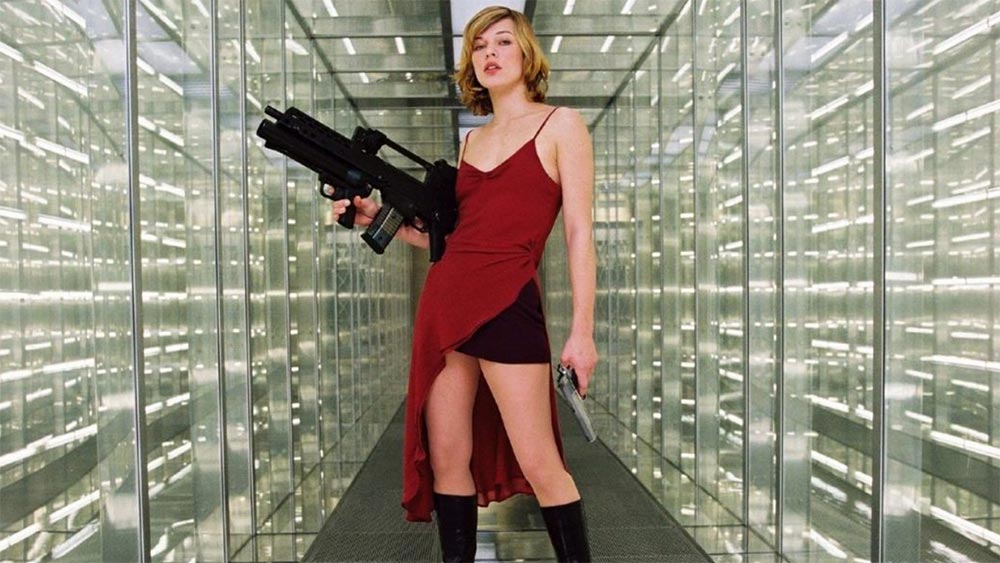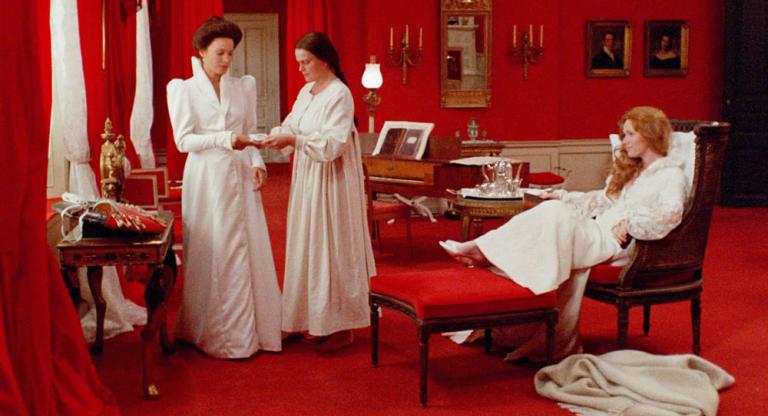If White Zombie (1932) marks the beginning of the first zombie cycle in the American horror film canon, and The Night of the Living Dead (1968) marks the second, then Resident Evil (2002) represents the beginning of the third (along with 28 Days Later, which came out the same year). Paul W. S. Anderson’s film also represents the second wave of video-game adaptations, the first having begun rather inauspiciously in 1993 with Super Mario Bros. (which has recently been getting the recognition it deserves as a brooding cyberpunk fable), followed by Anderson’s own Mortal Kombat (1995). Indeed, Anderson may have done more to kickstart the art of the video-game adaptation than anyone except the much-maligned Uwe Boll (House of the Dead, BloodRayne), to whom he is understandably often compared.
Harnessing the otherworldly moxie of Ukrainian-born Milla Jovovich—who here essentially reprises her role, as a kind of neonatal mystery figure with hidden powers, from The Fifth Element (1997)—Anderson leans heavily into the post-Matrix trope of an unwitting savior who emerges naked and pastless only to discover that they know kung fu and are uniquely equipped to take down a sublime technocratic threat to humanity. This clear nod to the Wachowskis’ magnum opus justifies some of the accusations of derivativeness that have been leveled at Anderson, as do his rather obvious nods to 2001: A Space Odyssey (the AI villain represented by a Gorgon-eye camera lens), The Shining (one of the first zombies shows up limping and dragging a fire axe), and The Thing (the practical effects used to represent the Licker look a lot like Rob Bottin’s creature puppetry). I’d be surprised if Anderson hadn’t also been inspired by the work of Vincenzo Natali (Elevated, Cube), whose claustrophobic chamber horror Resident Evil seems to channel along with the kind of semi-campy situational horror that had recently been brought into vogue by Final Destination (2000).
Anderson’s most direct inspiration was, of course, Shinji Mikami’s landmark video-game franchise, which by 2002 was already four installments deep. For fans of the series, the changes in tone and key plot points in the adaptation may have come as a disappointment, but Anderson’s manager, Ken Kamins, has defended his creative decisions: “He had a strong point of view about how to honor the fans of the game while appealing to people who might not have ever played the game.” To this end, there are many direct references to the game’s interface, such as the surveillance-camera HUDs that can identify characters’ weapons and oxygen levels and a 3-D map of the underground research facility in which our heroes are trapped. The film also pays tribute to the games’ groundbreaking fixed-camera positioning through the extensive use of surveillance-camera POVs.
Anderson may remain ghettoized in the critical discourse as an unoriginal and shamelessly profit-driven opportunist who, at best, merits the kudos of a competent technician, but perhaps it’s time for him to take his place in the pantheon of European-born genre directors who made their mark in Hollywood, alongside Ridley Scott, Paul Verhoeven, and Roland Emmerich. Like Scott, Anderson is from northern England and directed his first feature in the U.K.; and like Emmerich, Anderson chose to work with international funding for more creative control. Anderson told Variety, “I think the fact that [Resident Evil] . . . was a German-U.K. co-production, shot entirely in Europe, with a primarily British and German crew, allowed us to force through a few things that if we had been developed within a studio system may not have happened.”
It could be thanks to this lack of strict studio oversight that Resident Evil is so deliciously, if somewhat naïvely, anti-corporate. The main villain—represented by many avatars, from a British-accented AI to squads of faceless scientists in hazmat suits—is the Umbrella Corporation, “the largest commercial entity in the United States.” We are told that “in the beginning of the 21st century,” the company has become “the leading supplier of computer technology, medical products, and healthcare,” while behind the scenes, unbeknownst to even its own employees, “its massive profits are generated by military technology, genetic experimentation, and viral weaponry.” Jovocich’s main ally, Eric Mabius, infiltrates the corporation’s compound by pretending to be a cop but is in reality an anti-corporate activist who has decided to pursue “more direct action” than his comrades. The film’s thesis is expressed in Mabius’s monologue at the end of Act II, when he explains, with touching earnestness, that “corporations like Umbrella think they’re above the law, but they’re not.” He reveals that the firm is engaged in clandestine research. “What kind of research?” asks Jovovich. Mabius pauses for a grave beat, then half-whispers, “The illegal kind.” It’s no surprise that, together with 28 Days Later, Resident Evil helped cement the place of lab-leak theory in the popular discourse around pandemics, the sinister collusion of megacorporations and governments—and their routine suppression of the Truth—henceforth a banal matter of established fact in our collective imagination.
Something that may strike viewers attuned to the subtleties of American class relations is that, while the protagonist’s support team (e.g., Michelle Rodriguez, Martin Crewes) are coded as blue collar, the zombies are all tech workers. Here we have a multiethnic cadre of uniformed proles protecting a mansion-dwelling parvenu in evening attire against a horde of scientists and engineers. “You’re going to have to work for your meal!” Crewes shouts at the white-collar horde clawing at his feet, intimating that, for once, they’re going to have to perform real, material labor for their social reproduction.
Resident Evil screens tonight and tomorrow, April 20 and 21, in 35mm at Roxy Cinema.



